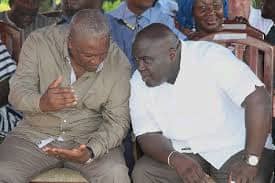Adnan Adams Mohammed
Trade Unions and economist have hailed the proposed 24-hour economy for Ghana by former President John Mahama.
They believe it ‘could be the game-changer’ and asked to know a lot more about this ‘great idea’.
The Ex President Mahama during his engagement with Trades Union Congress (TUC) as part of his Building a Better Ghana Tour, last week, proposed the idea of 24-hour economy to help in expanding the economy whiles creating jobs.
“I think, this one, Comrade [referring to Mr Mahama], you have to take your time, because I can imagine the amount of jobs that this kind of thing will create”, Secretary-General of TUC, Yaw Baah, affirmed idea.
“Such an economy “could be the game-changer”, explaining: “…You have an opportunity in this country, to work 24 hours: three shifts. So, if you don’t get a job in the morning, you can get it in the afternoon or in the night”.
“So, where are the young people? Get ready for jobs”, Dr Baah charged.
Consequently, in a statement released last week, a US-based economist, Dr Sa-ad Iddrisu, expressed his enthusiasm for Mahama’s policy, stating that it has the potential to be a game-changer for the Ghanaian economy.
Dr Iddrisu highlighted the advantages of such an economic model, stating, “The concept of a 24-hour economy, common in most developed nations, involves three working shifts and offers many advantages.”
Dr Iddrisu highlighted the advantages of such an economic model, stating, “The concept of a 24-hour economy, common in most developed nations, involves three working shifts and offers many advantages.”
He explained that extending business operating hours beyond the conventional 8 am to 5 pm would substantially reduce Ghana’s high unemployment levels.
The need for additional shifts would create job opportunities and offer workers flexible working hours, promoting a sustainable and productive workforce, the statement said.
Dr Iddrisu noted that implementing a 24-hour economy would require enhanced security measures, leading to a reduction in urban crime rates and generating additional employment opportunities within the security forces, particularly benefiting the youth.
He emphasised that a 24-hour economy would drive improvements in essential services like electricity and water supply, which are vital for the economy’s uninterrupted functioning.
“Addressing these services would significantly benefit citizens, as consistent power and water supply are essential for sustaining a 24-hour economy,” he added.
Dr Iddrisu also highlighted the potential for nightlife tourism as a significant benefit of a 24-hour economy.
“Major cities like Accra, Kumasi, Tamale, Takoradi, and Ho could stimulate nightlife tourism, attracting youth and travelers seeking unique experiences and generating additional revenue for local businesses and the overall economy,” he projected.
Among other advantages, he mentioned traffic reduction and increased foreign competitiveness, stating that a 24-hour economy has the potential to alleviate traffic congestion during peak hours and enable Ghanaian youth to compete globally without relocating.
Information technology companies, for instance, could cater to foreign clients around the clock, leading to increased revenue and employment opportunities, he stated.
While acknowledging the numerous benefits of a 24-hour economy, Dr Iddrisu also cautioned about potential challenges, such as an increase in night crimes.
He stressed the importance of vigilant support and engagement from citizens, community leaders, religious figures, and chiefs, as well as careful consideration when identifying sectors within the Ghanaian economy suitable for 24-hour operation.
This balanced approach would avoid overwhelming specific industries.




























